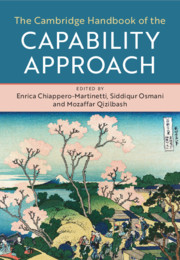Book contents
- The Cambridge Handbook of the Capability Approach
- The Cambridge Handbook of the Capability Approach
- Copyright page
- Dedication
- Contents
- Figures
- Tables
- Contributors
- Foreword
- Acknowledgements
- General Introduction
- Part I Historical Antecedents and Philosophical Debates
- Introduction to Part I
- 1 The Capabilities Approach and the History of Philosophy
- 2 Karl Marx and the Capabilities Approach
- 3 Utility and Capability
- 4 Intellectual History and Defending the Capabilities Approach
- 5 Sen, Smith and the Cambridge Tradition
- 6 The Capability Approach to Well-Being and Freedom from the Viewpoint of Welfare Economics and Social Choice Theory
- 7 Resources or Capabilities?
- 8 Taking Multidimensionality Seriously
- 9 The Capabilities Approach and Political Liberalism
- 10 Selecting a List
- 11 Individualism and the Capability Approach
- 12 The Politics of Wonder
- Part II Methods, Measurement and Empirical Evidence
- Part III Issues in Public Policy
- Index
- References
7 - Resources or Capabilities?
An Introduction to the Debate
from Part I - Historical Antecedents and Philosophical Debates
Published online by Cambridge University Press: 11 November 2020
- The Cambridge Handbook of the Capability Approach
- The Cambridge Handbook of the Capability Approach
- Copyright page
- Dedication
- Contents
- Figures
- Tables
- Contributors
- Foreword
- Acknowledgements
- General Introduction
- Part I Historical Antecedents and Philosophical Debates
- Introduction to Part I
- 1 The Capabilities Approach and the History of Philosophy
- 2 Karl Marx and the Capabilities Approach
- 3 Utility and Capability
- 4 Intellectual History and Defending the Capabilities Approach
- 5 Sen, Smith and the Cambridge Tradition
- 6 The Capability Approach to Well-Being and Freedom from the Viewpoint of Welfare Economics and Social Choice Theory
- 7 Resources or Capabilities?
- 8 Taking Multidimensionality Seriously
- 9 The Capabilities Approach and Political Liberalism
- 10 Selecting a List
- 11 Individualism and the Capability Approach
- 12 The Politics of Wonder
- Part II Methods, Measurement and Empirical Evidence
- Part III Issues in Public Policy
- Index
- References
Summary
This chapter gives an introduction to the debate between resourcists and capabilitarians on the best metric for interpersonal comparisons of ‘advantage’. It starts by identifying a number of factors that complicate the debate and should be kept in mind while reading this body of literature. The remainder of the chapter zooms in on the philosophical literature about justice, addressing two main topics. The first is the existence of immense human diversity, which resourcists like Rawls and Pogge insufficiently acknowledge and address according to capabilitarians. The second topic is neutrality towards the good life, a value which capabilitarians like Nussbaum fail to respect according to resourcists. In the course of the chapter, several theoretical distinctions are identified that underlie the debate: chance versus choice, natural versus social causes, ideal versus non-ideal theories of justice and distributive justice versus justice as recognition. The difference between resourcists and capabilitarians, so it is concluded, is as much a difference in how they frame the debate about justice as a difference in the evaluative space that they defend.
- Type
- Chapter
- Information
- The Cambridge Handbook of the Capability Approach , pp. 126 - 145Publisher: Cambridge University PressPrint publication year: 2020

